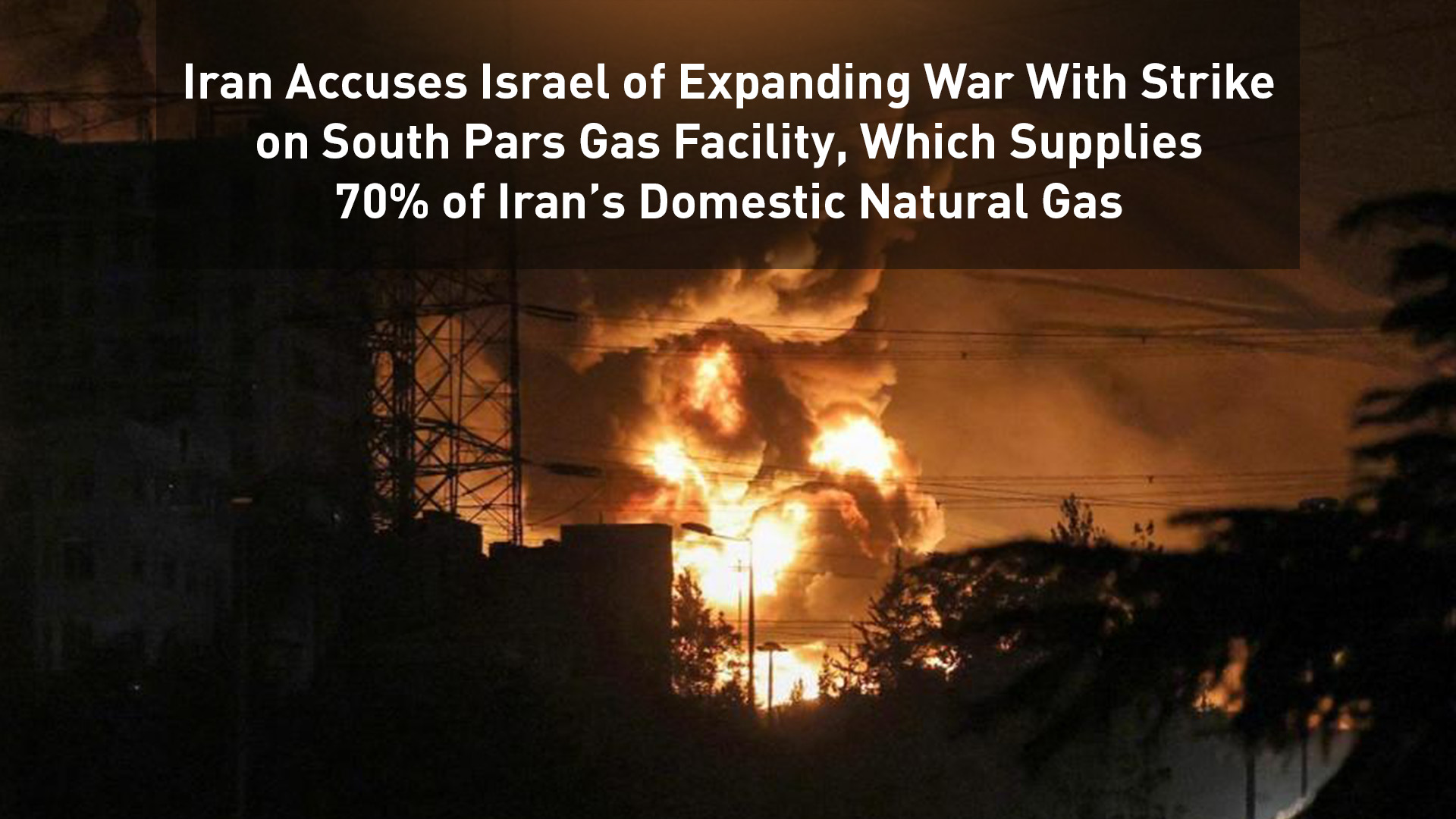Iran Accuses Israel of Expanding War With Strike on South Pars Gas Facility, Which Supplies 70% of Iran’s Domestic Natural Gas
Araghchi condemned the Israeli strike on the South Pars gas field, describing it as “an extremely dangerous move” and “a major strategic mistake.” The facility provides around 70 percent of the country’s domestic natural gas supply.

ERBIL (Kurdistan24) — Iran’s Foreign Minister Abbas Araghchi on Sunday accused Israel of deliberately attempting to expand the ongoing conflict beyond Iranian territory by targeting one of the Islamic Republic’s most vital gas facilities on the Gulf coast, according to AFP.
Speaking to foreign diplomats during a televised meeting, Araghchi condemned the Israeli strike on the South Pars gas field, describing it as “an extremely dangerous move” and “a major strategic mistake.” The facility, located offshore near Iran’s southern Bushehr province, provides around 70 percent of the country’s domestic natural gas supply and sits atop the world’s largest known gas reserve shared with Qatar.
“Dragging the conflict into the Persian Gulf region is a major strategic mistake, likely deliberate and intended to extend the war beyond Iranian territory,” Araghchi said, warning that any military activity in the Gulf “could involve the entire region—and possibly the whole world,” AFP reported.
The remarks followed a Saturday drone strike, attributed by Iranian media to Israel, which triggered a massive explosion and fire at South Pars Phase 14. The attack came just one day after Israel launched its largest offensive against Iran to date, targeting nuclear sites, military bases, and residential areas. The assault killed top Iranian commanders and nuclear scientists, marking a sharp escalation in hostilities.
In retaliation, Iran fired hundreds of missiles into Israeli cities on the following days, including a barrage of missiles on early Sunday, leaving at least 13 people dead and dozens wounded. Among the hardest-hit areas was Bat Yam, near Tel Aviv, where a missile scored a direct hit on an apartment building.
“I was sleeping and didn’t hear the siren,” said Julia Zilbergoltz, a resident of Bat Yam, in an interview with AFP. “I woke up to a boom. I’m stressed and in shock.”
According to Israeli officials, six people—including two children—were killed in the Bat Yam strike. Another four were killed in the northern town of Tamra, bringing the total death toll in Israel to 13 since the fighting began Friday. Dozens more were injured, and search-and-rescue teams continued working through the rubble to find survivors.
Bat Yam Mayor Tzvika Brot said in a Facebook post that the missile caused “great destruction and damage to dozens of buildings,” with over 100 people injured and others still trapped. "Teams from the Home Front Command have been working here for several hours now, and will remain here until they find them," he said.
“I didn’t want to go down to the shelter. My mother convinced me,” said resident Shahar Ben Zion. “There was an explosion and I thought the whole house had collapsed… Thank God, it was a miracle we survived.”
Israeli television aired images of destruction across Tel Aviv, Rishon Lezion, Bat Yam, and other cities hit in the overnight barrage. Government data indicated that 22 sites were struck by Iranian missiles.
Meanwhile, Iran reported additional Israeli attacks Sunday, including a strike on a facility affiliated with the Ministry of Defense in Isfahan. The Iranian ISNA news agency cited deputy provincial governor Akbar Salehi saying, “Possible damages are under investigation.”
Adding to the mounting tensions, Iranian police on Sunday arrested two individuals in Alborz province west of Tehran for alleged links to the Mossad, Israel’s intelligence agency. According to Tasnim news agency, the suspects were in possession of bomb-making materials, booby traps, and electronic equipment.
In his Sunday remarks, Araghchi said Israel’s strikes were intended to derail ongoing nuclear talks with the United States. “It is entirely clear that the Israeli regime does not want any agreement on the nuclear issue,” he said. “This was an attempt to undermine diplomacy and derail negotiations.”
The Iranian foreign minister also criticized the United Nations Security Council for its “indifference” to the Israeli attacks and argued that Iran’s missile retaliation constituted “legitimate self-defense.”
“We are defending ourselves; our defense is entirely legitimate. If the aggression stops, naturally our responses will also stop,” he stated.
Despite the intensifying conflict, Araghchi reiterated Iran’s openness to a nuclear deal that guarantees the country does not pursue atomic weapons, while insisting that Tehran would not accept any agreement that infringes on its sovereign nuclear rights.
The ongoing escalation between Israel and Iran, now spilling into both civilian centers and critical infrastructure, marks one of the most dangerous phases in their decades-long hostility, with implications threatening to destabilize the entire region.
Kurdistan24 English will continue to provide instant coverage and up-to-date news on developments in the ongoing conflict between Israel and Iran. Keep an eye on Kurdistan24 English's website and social media platforms for the latest updates.
